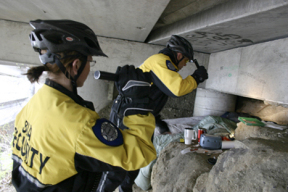Tacoma City Council voted Tuesday to approve a resolution to execute agreements with two local human service providers, which will broaden the scope of a pilot project aimed to remove homeless people from encampments and place them in housing with case management services.
The authorization permits $618,000 from the City’s Human Rights and Human Services special revenue fund to be allotted for services to be provided by Metropolitan Development Council (MDC) and Greater Lakes Mental Health Foundation — $544,000 will go to MDC; $74,000 will go to the Greater Lakes Mental Health Foundation.
The funds will be used to aim the year-old Housing First Encampment Initiative toward a new population of chronically homeless people who lack housing and live on the streets.
“The population served will include these persons unhoused and of significant impact on the city,” said Debbie Bergthold with the city’s human rights and human services department.
In total, program administrators hope to assist 55 people. Forty people would be helped by MDC, and 15 would be assisted by Greater Lakes.
The new project is called the Housing First Chronic Homeless Elimination Initiative. The agreements approved by City Council would fund the program through 2008, with money left over in 2009.
The earlier effort, Housing First Encampment Elimination Initiative, was launched last year to clear out 13 known homeless encampment scattered throughout the city. The pilot project aligned three human service providers — MDC, Greater Lakes, and Tacoma Rescue Mission.
According to Bergthold, 90 people were referred to housing. Twenty-five people were denied housing as a result of a screening process and criminal background check conducted by landlords. Of the remaining 65 people, 23 dropped out of the program.
Forty-two people remain housed as a result of the program.
Initially, the program aimed to house 100 people in its first year. However, organizers overestimated the number of people anticipated to be living in the encampments.
Bergthold said there was an initial rush of people coming into the program last fall, when the program was created. Since then, the numbers have dropped. On Monday, program administrators completed a sweep of earlier known encampments, and found five individual camps.
Next month, the University of Puget Sound will release a study documenting the program’s first year.
Similarly, during Tuesday’s meeting council authorized a resolution authorizing three amendments that complete funding for the program’s first year.








